高考英语语法考点解读:介词
- 格式:docx
- 大小:34.84 KB
- 文档页数:14


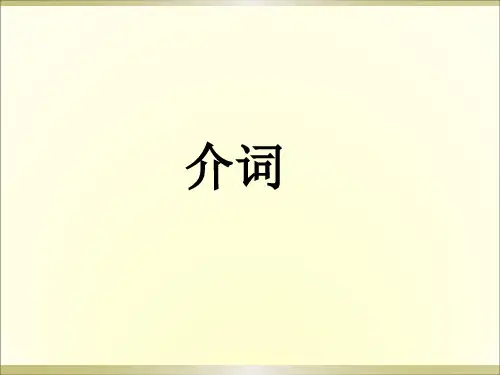
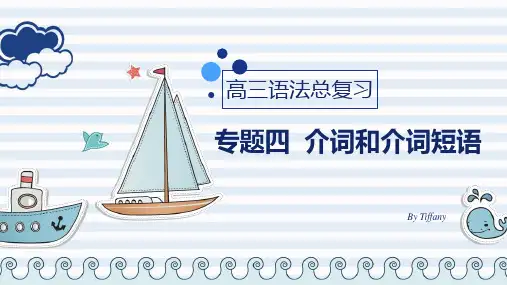
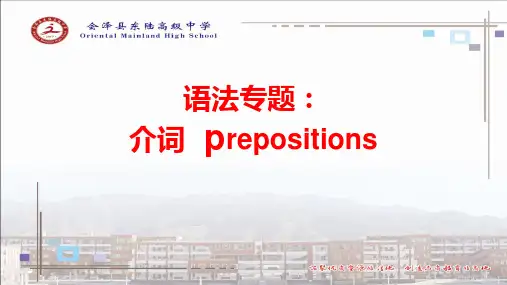
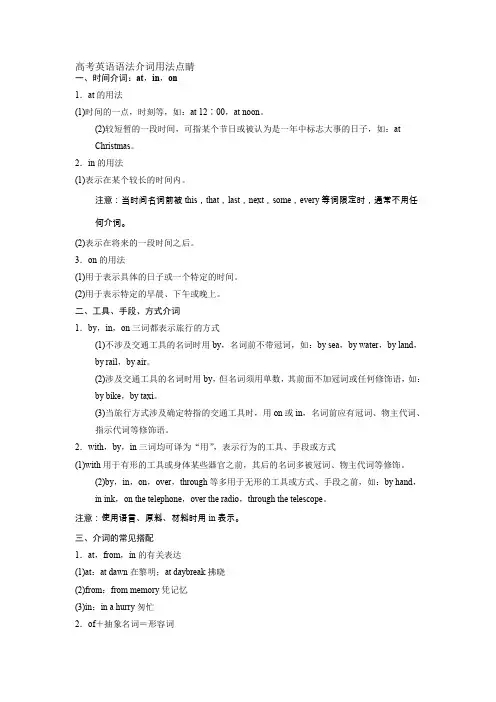
高考英语语法介词用法点睛一、时间介词:at,in,on1.at的用法(1)时间的一点,时刻等,如:at 12∶00,at noon。
(2)较短暂的一段时间,可指某个节日或被认为是一年中标志大事的日子,如:atChristmas。
2.in的用法(1)表示在某个较长的时间内。
注意:当时间名词前被this,that,last,next,some,every等词限定时,通常不用任何介词。
(2)表示在将来的一段时间之后。
3.on的用法(1)用于表示具体的日子或一个特定的时间。
(2)用于表示特定的早晨、下午或晚上。
二、工具、手段、方式介词1.by,in,on三词都表示旅行的方式(1)不涉及交通工具的名词时用by,名词前不带冠词,如:by sea,by water,by land,by rail,by air。
(2)涉及交通工具的名词时用by,但名词须用单数,其前面不加冠词或任何修饰语,如:by bike,by taxi。
(3)当旅行方式涉及确定特指的交通工具时,用on或in,名词前应有冠词、物主代词、指示代词等修饰语。
2.with,by,in三词均可译为“用”,表示行为的工具、手段或方式(1)with用于有形的工具或身体某些器官之前,其后的名词多被冠词、物主代词等修饰。
(2)by,in,on,over,through等多用于无形的工具或方式、手段之前,如:by hand,in ink,on the telephone,over the radio,through the telescope。
注意:使用语言、原料、材料时用in表示。
三、介词的常见搭配1.at,from,in的有关表达(1)at:at dawn在黎明;at daybreak拂晓(2)from:from memory凭记忆(3)in:in a hurry匆忙2.of+抽象名词=形容词(1)of+great/much+抽象名词=very+形容词(2)of+no+抽象名词=not+形容词3.to与情感名词连用,表示“某种行动后产生的感觉”to+one’s+情感名词=to the+情感名词+of sb.介词范例:1.The Scottish girl ________ blue eyes won the first prize in the Fifth Chinese Speech Contest.A.by B.of C.in D.with【答案】选D【解析】句意:那个蓝色眼睛的苏格兰女孩在第五届汉语演讲比赛中获得了第一名。
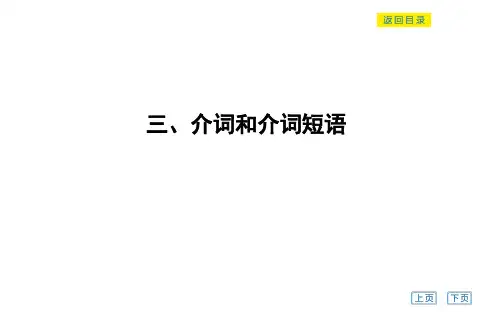
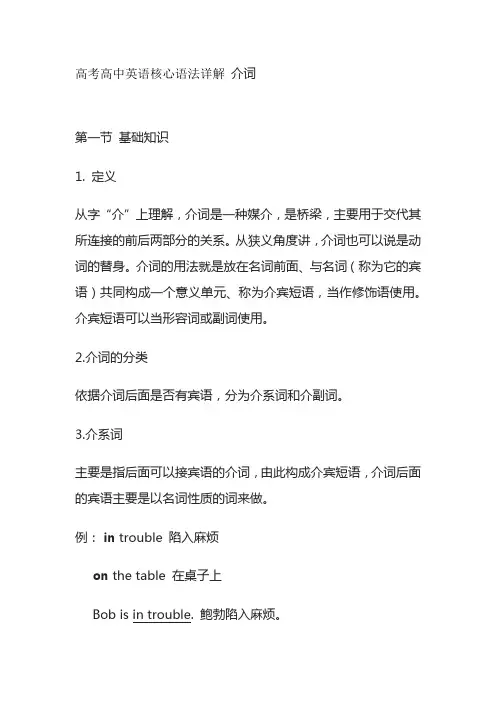
高考高中英语核心语法详解介词第一节基础知识1. 定义从字“介”上理解,介词是一种媒介,是桥梁,主要用于交代其所连接的前后两部分的关系。
从狭义角度讲,介词也可以说是动词的替身。
介词的用法就是放在名词前面、与名词(称为它的宾语)共同构成一个意义单元、称为介宾短语,当作修饰语使用。
介宾短语可以当形容词或副词使用。
2.介词的分类依据介词后面是否有宾语,分为介系词和介副词。
3.介系词主要是指后面可以接宾语的介词,由此构成介宾短语,介词后面的宾语主要是以名词性质的词来做。
例:in trouble 陷入麻烦on the table 在桌子上Bob is in trouble. 鲍勃陷入麻烦。
A red apple is on the table. 一个红苹果放在桌子上了。
4.介副词后面没有宾语,而是直接当副词使用。
Come in. 进来!The soldier stood up. 那名士兵站起来了。
5. 介副词和介词共同使用Mary went down to the basement. 玛丽去了地下室。
down 是介副词,后面没有宾语、直接修饰动词went;to 是介系词,后接名词词组the basement 当宾语、构成一个介词词组to the basement;went 看作不及物动词,后接介词to,再加宾语the basement;He has gone over to your office.over 是介副词,直接修饰动词has gone;to 是介词,后接名词词组your office 当宾语,构成一个介词词组to your office;gone看作不及物动词,后接介词to,再加宾语your office;第二节介系词在短语层面的应用介系词加宾语构成介宾短语后,主要出现在后修饰位置,其作用是交代中心词与其后的宾语之间的关系。
此时介宾短语也可视为形容词的性质。
例:a.2000 entry into the World Trade Organization2000年加入世贸b.an important earner of foreign exchange 赚取外汇的重要来源c. a boom in exports 出口增长第三节介系词在句子层面的应用1. 前状/后状:With the warm weather, the trees grow very well. 天气暖和,树木生长的很好!Kill two birds with one stone. 一石二鸟/一举两得。
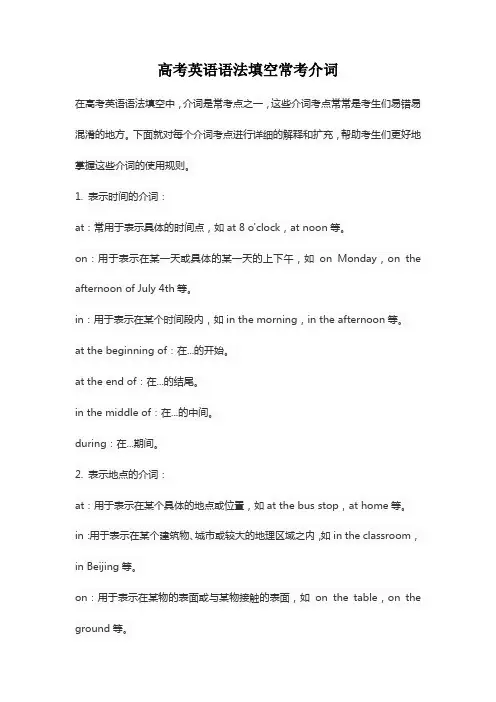
高考英语语法填空常考介词在高考英语语法填空中,介词是常考点之一,这些介词考点常常是考生们易错易混淆的地方。
下面就对每个介词考点进行详细的解释和扩充,帮助考生们更好地掌握这些介词的使用规则。
1. 表示时间的介词:at:常用于表示具体的时间点,如at 8 o'clock,at noon等。
on:用于表示在某一天或具体的某一天的上下午,如on Monday,on the afternoon of July 4th等。
in:用于表示在某个时间段内,如in the morning,in the afternoon等。
at the beginning of:在...的开始。
at the end of:在...的结尾。
in the middle of:在...的中间。
during:在...期间。
2. 表示地点的介词:at:用于表示在某个具体的地点或位置,如at the bus stop,at home等。
in:用于表示在某个建筑物、城市或较大的地理区域之内,如in the classroom,in Beijing等。
on:用于表示在某物的表面或与某物接触的表面,如on the table,on the ground等。
near:在...附近。
by:在...旁边。
between:在...之间。
in front of:在...的前面。
behind:在...的后面。
3. 表示方式的介词:by:用于表示通过某种方式或手段,如by bus,by phone等。
in:用于表示以某种状态或形式存在,如in English,in writing等。
on:用于表示在某种物体或表面上,如on the wall,on the table等。
4. 表示原因的介词:because of:由于...的原因。
due to:由于...的缘故。
这两个介词都可以用来表示原因,但略有区别。
because of更强调直接原因,而due to更强调因果关系。

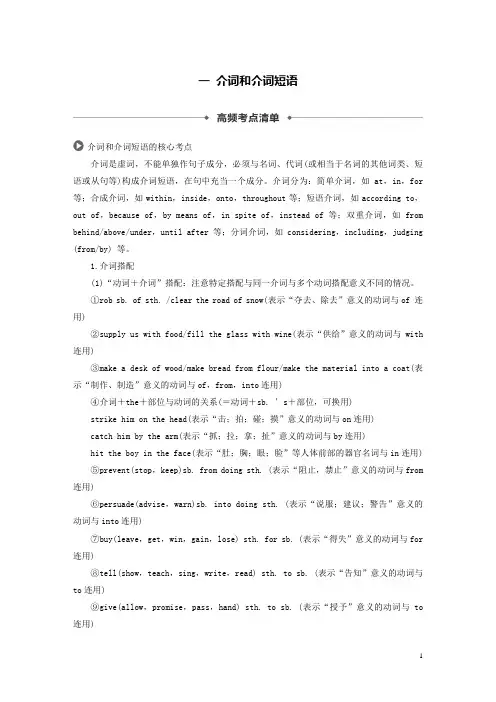
一介词和介词短语介词和介词短语的核心考点介词是虚词,不能单独作句子成分,必须与名词、代词(或相当于名词的其他词类、短语或从句等)构成介词短语,在句中充当一个成分。
介词分为:简单介词,如at,in,for 等;合成介词,如within,inside,onto,throughout等;短语介词,如according to,out of,because of,by means of,in spite of,instead of等;双重介词,如from behind/above/under,until after等;分词介词,如considering,including,judging (from/by) 等。
1.介词搭配(1)“动词+介词”搭配:注意特定搭配与同一介词与多个动词搭配意义不同的情况。
①rob sb. of sth. /clear the road of snow(表示“夺去、除去”意义的动词与of 连用)②supply us with food/fill the glass with wine(表示“供给”意义的动词与with 连用)③make a desk of wood/mak e bread from flour/make the material into a coat(表示“制作、制造”意义的动词与of,from,into连用)④介词+the+部位与动词的关系(=动词+sb. ’s+部位,可换用)strike him on the head(表示“击;拍;碰;摸”意义的动词与on连用)catch him by the arm(表示“抓;拉;拿;扯”意义的动词与by连用)hit the boy in the face(表示“肚;胸;眼;脸”等人体前部的器官名词与in连用)⑤prevent(stop,keep)sb. from doing sth. (表示“阻止,禁止”意义的动词与from 连用)⑥persuade(advise,warn)sb. into doing sth. (表示“说服;建议;警告”意义的动词与into连用)⑦buy(leave,get,win,gain,lose) sth. for sb. (表示“得失”意义的动词与for 连用)⑧tell(show,teach,sing,write,read) sth. to sb. (表示“告知”意义的动词与to连用)⑨give(allow,promise,pass,hand) sth. to sb. (表示“授予”意义的动词与to 连用)注意:⑦⑧⑨可换成buy sb. sth. ,tell sb. sth. ,give sb. sth. 双宾结构。
第八章介词一、概述介词又叫前置词,是一种虚词,在句子中不能单独使用。
只能与名词、代词等构成介词短语,在句中作状语、后置定语、表语和补语等。
介词的作用则是表明它后面的名词或代词(或相当于名词的其它词类、短语或从句)与其它句子成分的关系。
单音节词一般不重读,具有两个或两个以上音节的介词有一个音节要重读。
-What do you want with those old boxes? --你留着那些箱子干什么用?(作状语)-To put things in when I move to the new flat. --搬家时放东西用。
I sat down on one of those modern chairs with holes in it and waited.我坐在一把有网眼的新式椅子上等候着。
(作chairs的定语)She is among my most welcome visitors.她是我最欢迎的来访者之一。
(作表语)I found myself in hospital when I came to myself.我醒来时发现自己躺在医院里。
(作宾补)二、介词的位置1、介词通常位于名词或代词前The sunlight came in through the windows in the roof and lit up the whole room.阳光从天窗穿射入,照亮了整个房间。
This work is beyond my grasp.这件工作非我力所能及。
Shall we rest in the shade beneath these trees? 我们在树下阴凉处休息一下好吗?2、在某些结构中介词可以放在句尾(1)在特殊疑问句中在特殊疑问句中,介词可以放在句尾,和宾语分开,但依然存在着介宾关系。
Who (m) were you speaking to just now? 你刚才在和谁说话?Which desk did you put the book on? 你把书放在那个桌子上了?Who is she talking with? 她在和谁说话?注意:介词也可放在句首疑问词之前连同疑问词一起引起疑问句。
精品基础教育教学资料,仅供参考,需要可下载使用!高考英语二轮复习语法突破:介词一、介词(短语)语法题答题技巧:固定搭配:动词+介词;介词+名词;形容词+介词语境分析:介词基本语意及用法二、介词基本用法:1.表示地点、位置的介词1) “在……”at 在小地点He arrived at the station at ten.在……附近,旁边He is sitting at the table.in 在大地点He arrived in Shanghai yesterday.在…范围之内Jilin lies in the northeast of China.on 毗邻,接壤Russia lies on the north of China.to 在……范围外Korea is to the northeast of China.off 离…不远;The boat was anchored off the coast.2)“上/下”垂直不垂直相接触在……上over above on在……下under below beneath Eg. The bird is flying above my head.There is a stone bridge over the river.He put his watch on the desk.There is a cat under the table.Please write your name below the line.He stuck his phone beneath the table to avoid being found by the teacher.温度、高度速度、年龄高于, 多于above over低于, 少于below underEg. The temperature will stay above zero in the daytime.This place is below sea level.There are over forty students in the classroom.It took us under an hour to prepare for the coming meeting.3)across/through “穿过”She ran across the road.He walked through the forest.4)in/on “在…上”The apples on the tree seem to have been ripe.The bird in the tree seems to be singing.The little boy burst into tears because a ball happened to hit him on the nose. (头,额,鼻,耳,肩,腿,颈)You shouldn’t hit anyone in the face. (脸,眼,嘴,腹)2.表示时间的介词1) in , on,at “在……时”in >一天世纪、朝代、年、季节、月注:泛指早午晚in the 1950s, in summer, in January, in one’s life , in one’s thirtieson =一天具体某一天及其早、午、晚on May 1st, on Monday, on my birthdayon a cold night, on Sund ay afternoonat <一天某一时刻或较短暂的时间注:at (mid)night, at noon at 3:20, at this time of year at this moment, at the end of注:节日中如含有day, 介词用on;如含有festival,常用at;on New Year’s Day, on Children’s Dayat the Spring Festival,at Christmas,注:时间名词前有last, next, this, that, these, those,some, any, every, each, one, all等词时,前面不用介词。
高考英语复习语法知识专题讲解专题五介词与介词短语一、介词的句法功能1.作定语The key to the door is missing.2.作状语Her eyes were tired from long reading.3.作表语Japan is to the cast of China.4.作宾语补足语Make yourself at home.二.介词的宾语易错点名词、代词Don't forget to turn off the lights before leaving your classroom.Don't hide behind others.数词There was only one piece of cake, but we can cut it into two.The students began to show up by twos and threes.When we went in,we found his room at sixes and sevens.形容词、副词Her pronunciation is far from perfect. His uncle is from abroad. 动词-ing形式I succeeded in passing the driving test.On arriving in Venice, we knew that it was a city of water.动词不定式The plane is about to take off.宾语从句She got very angry because of what he had said.I am thinking of how I shall do more for the people.疑问词+ 不定式短语Marx gave us some advice on how to learn foreign languages. They are discussing how to sell the goods elsewhere.动词原形His father had nothing to do all day except play cards.介词短语The boy jumped from behind the door. The ball rolled out from under the table.三.介词的省略用法易错点1.of的省略The two girls are(of) the same age.2.from的省略Nobody can prevent us(from)getting married. You must stop her(from)telling such lies.3.in 的省略He spends nearly half of his monthly income(in)buying books.He wasted time(in)doing nothing.4.on的省略Keep(on)talking amongst yourselves.I'll be back in a minute.四.常用介词的用法比较集锦1.表示时间in/after in十时间段:一般用于将来时after+时间段:一般用于过去时He'll be back in a week. 他一周后回来。
英语介词详解
介词在英语中是一种虚词,用于表示名词或代词与句子其他部分之间的关系。
以下是介词的详细解释:
1.定义:介词是用于描述名词或代词与句子其他部分之间关系的词。
它们通常
放在名词或代词之前,表示方向、位置、时间、方式等。
2.功能:介词的主要功能是帮助建立名词或代词与其他句子成分之间的关系,
提供更多的语境和背景信息。
3.常见介词:以下是一些常见的英语介词:at、in、on、by、with、about、
over、before、after、during等。
4.用法:介词的用法非常灵活,需要根据上下文和语境来判断。
例如,在句子
“The book is on the table”中,介词“on”表示“在……上面”;在句子“I will meet you at the train station”中,介词“at”表示“在……
地方”。
5.注意事项:使用介词时需要注意一些常见错误,如多余的介词、缺少介词或
使用不当的介词等。
正确使用介词可以提高英语表达的准确性和流畅性。
介词是英语中一个非常重要的语言元素,正确使用介词可以帮助我们更好地表达思想,建立句子之间的关系,提高语言的质量。
介词是英语中最活跃的词类之一。
使用频率相当高,用法多而杂,一个介词可能有多种不同的用法;一个相近的意思又可以用不同的介词表达。
所以在一轮的备考中必须逐一掌握每个高频介词的用法;弄清楚易混介词的用法异同;能够根据具体语境灵活运用介词。
常用介词、易错介词的辨析以及介词固定搭配的考查将是介词考查的主要方向。
一、介词的分类与语法功能介词是虚词,不能单独作句子成分,必须与名词、代词(或相当于名词的其他词类或短语等)构成介词短语,在句中充当一个成分。
介词分为:简单介词,如at,in,for等;合成介词,如within,inside,onto,throughout 等;短语介词,如according to,out of,by means of,in spite of,instead of等;双重介词,如from behind /above /under,until after等;分词介词,如considering,including,judging (from/by) 等。
二、介词的意义1.表示时间的介词(1)in表示“在某一时间段”或“在某一时候”,如用在月、季、份、时代、世纪等时间名词的前面,或用来泛指一天的某一段时间。
in也可以指“在……之后”,表示从说话起的若干时间内。
如:in July/summer//ancient timesThe bus will be here in ten minutes.(2)on表示“在特定的某一天”,也可用于带有修饰语的一天的某个时间段之前。
如:on Saturday, on Saturday morning, on the morning of August 1st(3)at表示“在某一时间点”,或用来表示不确定的时间和短期的假日、时节等。
如:at six o'clock, at Easter(4)over, through (out)两者均指“经过的全部时间”。
如:Stay over the Christmas.(5)for与since:for表示动作或状态延续的全部时间长,为“长达……”之意;since用于指从过去特定的某个时刻到说话时为止的一段时间;含有since时间短语的句子要用完成时,但含有for时间短语的句子不一定要用完成时。
如:I have been there for six years.We have not seen each other since 1993.(6)during指“在……时期/时间内”,必须接表示一段时间的词或词组作宾语。
如:She was ill for a week, and during that week she ate little.2.表示地点的介词(1)above, below,over, under,on, on top of, beneath, underneath: above和below分别表示“高于”和“低于”的意思,不一定指垂直方向上的上下;over和under分别表示垂直方向上的上下或高低;on/on top of和beneath/underneath表示“和表面相接触”意义上的上下。
以上三组介词互为反义词。
如:The temple stands on top of the hill.The pen is beneath the book.There is a lamp on the desk.(2)at, on, in:at指小地点或集会场合;on表示线或面上的位置;in表示在立体、区域或环境内,特别是那些较大,能够容纳相应事物的环境。
如:He works at Peking University.Your radio is on the desk.He's sitting in the sun.(3)between与among:between用来说明“在……两者之间”或“三个以上人或事物中的每两者之间的相互关系”;among用来说明“在……三者以上之间”的相互关系;among可以用来表示没有确定数目的物体之间的相互关系。
如:There is a small river between the two villages.The book is the best among these modern novels.The relations between various countries are very important.3.表示原因的介词。
(1)for常常表示褒贬、奖惩的原因或心理原因。
如:They will reward you for your help.(2)from和out of常常表示动机或原因;through表示消极或间接的原因。
如:He feels weak from lack of sleep.He broke down through overwork.4.表示目的的介词for和to都可以引导目的地。
for表示拟定的接收人或目的,for跟在含有出发或开始意义的动词后,如:leave, set out, start, depart, sail等;to表示实际的接收人或目的,to跟在含有方向性的动词后,如:go, come, run, walk, move, fly, drive, ride等。
如:We have left for Hong Kong.He flew to America via Hong Kong.5.表示“关于……”的介词一般about用于比较随便的谈话或非正式的文体;on用于正式的讲话、著作或报告中;of 用于动词talk, read, know, hear等的后面。
如:What are you talking about?in terms of natural resources6.表示原料的介词of和out of表示制成品的材料仍保持原材料的性质;from表示制成品已失去了原材料的性质。
如:His house was built of brick.He made these toys out of old cigarboxes.Steel is made from iron.7.表示价格的介词at和for都可表示价格,at仅表示价格;for还表示“交换”。
如:Eggs are sold at 95 cents a dozen here.I bought it for five pounds.三、常见的介词搭配1.“介词+名词”型(1)in +名词in advance在前头,事先,预先in case如果,万一in charge 主管,掌管,看管in common 共有,共同,公有in demand 有需要的in doubt 感到疑惑的,难以确定的in effect 实际上,生效in fact 事实上in order 按序,井然有序,情况良好;恰当in progress 进行中in return 作为回报in turn 依次,替换地;相应地,转而in vain 徒劳(2)on+名词on guard在值勤on leave 在休假on holiday 在假on strike 罢工on sale 出售on loan 借贷on+the+名词on the move 在移动,搬迁;离开on the march 在行军on the flow 在涨潮on the increase 正在增加on the go 正在活动,正在奔走on the air 正在广播on the fly 正在飞行(3)beyond +名词beyond one's power 是某人力所不及的beyond praise 夸不胜夸beyond one's reach 够不着beyond description 难以形容beyond words 无法用语言形容beyond doubt 无疑beyond one's understanding 无法理解(4)under +名词under development在发展中under observation 在观察中under test 在测试中under construction 在建设中under examination 在检查(调查)中under consideration 在考虑中under repair 在修理中(5)at +名词at length详细地,长时间at sea 茫然at will 任意地at work 在上班at lunch 在吃午饭at rest 在休息at table 在吃饭at school 上at church 做礼拜at peace 处于和平状态(6)out of +名词out of breath上气不接下气out of balance 失去平衡out of date 过时out of patience 不耐烦out of control 失去控制out of business 破产out of style 过时,不时髦out of the ordinary 不寻常的out of touch 失去联系2.复杂介词型(1)表示原因(通常在句中作状语), 意为“由于,因为”。
because of:表示实际原因(表达一种较强的因果关系);on account of:常用来引述逻辑、理性和事实因素。
(2)表示“除……之外”。
with the exception of=except, except for“除……之外”;apart from (=美式英语中的aside from)是个复合介词,既可表示“除……之外”,相当于except (for), 又可以表示“除……之外,(还,也)”,相当于besides;in addition to“除……之外(还,也)”,相当于besides。
(3)表示“有关,关于”。
concerning=regarding“关于,就……而论,在……方面”;with respect to“关于,就……而言”;as for和as to用于句首时表示“至于”。
(4)表示“在……之前”。
ahead of=in advance of,可表示“(在空间或时间上比某人或某事物)更前,更早”,还可表示“领先,优于”;in front of 多指空间的前后关系,“在……前方”。
(5)表示“支持,赞成”。
in support of 维护,支持,支援;in favor of 可指某人“支持,赞成”,也可指事物“有利于……”。
(6)表示“鉴于,由于;根据,按照”。
in the light of 按照,考虑到in terms of 就……而言,谈到according to 根据;按照in view of 鉴于,因为(7)表示“尽管”。